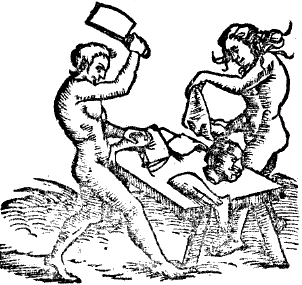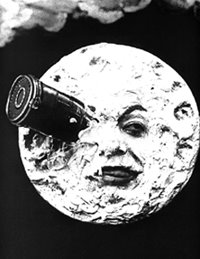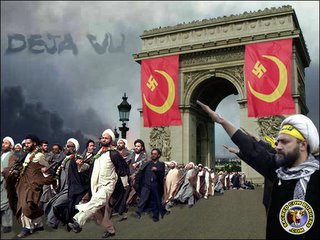
Public Opinion and Tabu
Native Indians in Northern Canada provide a good example of what life in Europe will be like in 20 years if Europeans allow the further Eurabainization to continue apace. Laurie Gough wrote of a village in northern Ontario, Canada that is a vision of our future in our cities, not in some remote village in the Arctic Circle but in Paris, in Rome, in London. We saw a world of feral children in feral communities, and the picture is one of culture in psychosis. And people are afraid to say anything about it. There is a tabu against speaking truth to poverty pimps and UN workers and the media. Worse, one dare not speak in universities of poverty and ferality resulting from socialist government. This ain't no stinking university. We blog!
Below is the work of a woman who is afraid to let her name be known in public for fear of reprisals. She too taught school in a land of psychotic and feral people. Because one woman wrote, this woman writes. Because these two women write we hope others will find the courage to write and to speak and to act. There is fear, and real fear of violence, of violent death at the hands of feral savages out of control and fueled by exultation and exhortation. Those people will die like dogs if we allow our systems of government to continue on this path of throwing money and sentimentality and exclusionary privilege at them. "You are Others," the p.c. nannies chant, "and we are not worthy!"
Well, take a look at what we get when the Left dhimmi fascists control the world. And then think about Theo van Gogh. And think of Hirsi Ali and Geert Wilders and so many others who live under constant threat of death by our feral Muslim populations pandered to and primed with cash and permission from our leaders to rant and scream and carry on like monsters unrestrained by any civilizing forces at all, only further inflamed by our appeasement, our encouragement that they act out their savageries and punish us for whatever imagined harm we might have done when we were children or whatever our parents did, or our grandparents or our ancestors of a 1000 years ago. this is the future of our world if we do nothing more than what we do now. this is Canada today. It is Europe tomorrow:
Third World, Sask.
National Post
Wed 23 Nov 2005
Lynne Foster*
National Post
There are native reserves where educated people live happy,
productive lives. I have visited some of them. In general, they are
communities that are close to major population centres, where
residents can access services, gain an education and learn how to
run a business.
But as Laurie Gough showed in her Saturday National Post article
about teaching a Grade Three class in the northern Ontario reserve
of Kashechewan, there are other more remote reserves where residents
are demoralized and impoverished. These reserves are out of sight,
out of mind, with minimal access to the outside world -- ignored by
everyone, money thrown at them without any accountability.
I have worked as a teacher on just such a reserve. Ms. Gough left
her job after three months. For reasons I still can't understand, I
managed to stay for an entire school year.
It was a reserve in northern Saskatchewan. (I won't identify it.
Its people suffer enough as it is. And in any case, there are many
others like it.) I'd made the trip full of high hopes, but doubts
emerged as soon as I arrived with the other teachers.
"You are no longer in Canada," we were told. "This is our land, our
country and you will obey our laws." (This proved true: When I
started, I was offered a set figure as pay. A year later, I received
less than half of this amount. I discovered one cannot litigate
against anyone on a reserve.) In retrospect, I don't know why I
didn't just rev up the pickup and head home right there and then.
The reserve's population was divided into two groups. First, there
was the privileged set, a small group of related people who were on
the band council, worked for the council offices or worked at
band-financed jobs, like driving the snowplough truck.
This group lived at one end of the reserve, where the land was dry,
in attractive houses complete with with Western-style amenities.
They had new cars and trucks, and dressed well.
All the rest, some 95% of the native people on this reserve, lived
in the bush, where the ground was a sea of mud most of the time,
where the elementary school was full of mould, its basement gym
covered with fetid water. Drinking water came from a single tank,
which was accessed by hand. Sewage treatment was non-existent.
Household garbage simply was thrown out people's back doors, to be
feasted on by wild dogs and bears. All the garbage and sewage
leached into the ground -- and then into the river.
There was no regular medical care. Doctors in town had offered to
set up a program of weekly visits. But the Band Council refused.
It was said that most females had been raped at least once. I
remember learning that a six-year-old girl in my class had been
raped just before school began. The episode was seen as
unexceptional, and the rapist suffered no punishment.
I went to many of the houses in which my students lived. It was
common to find an empty house, with nothing but a table, filthy
mattresses on the floor, and a wood stove. Most of the food on hand
was canned or packaged, if there was any at all.
Dogs ran wild, often half-starved. They were beaten and kicked by
the men on the reserve. One large dog -- some said he was actually a
wolf -- claimed me as his food source, slept on my porch, and
followed me everywhere. I fed him as well as I could. He had a wound
on his neck, where one of the other dogs had gashed him.
In the pitch-black nights, the only sounds one heard were the dogs
barking -- and gunshots. The housing provided for teachers was
flimsy. I always feared a stray bullet would come through the wall.
The teachers lived in row houses, apart from the rest of the
reserve. One evening, about a dozen enraged adults burst into the
dwelling of one of my male colleagues and beat him severely over
some disagreement.
I, too, sometimes heard fists banging on my door occasionally. On
such occasions, I took a used a large heavy chair to barricade the
entrance.
Children came to my unit all the time begging for food, telling me
their parents had been drunk for days, that there was nothing left
in their house to eat. I cooked and served eggs and toast and
whatever I could to as many as I could.
Unlike the children Ms. Gough had in her Grade Three Kashechewan
class, my students were generally well-behaved -- except for one,
who suffered severely from fetal alcohol syndrome and burst into
tantrums several times a day. Still, the children had little idea
what it meant to sit in school and learn in a structured
environment. So I had to keep their attention with a great deal of
art and music, singing and poetry, and physical activity. Most
barely spoke English. All of the children had head lice, and I had
to take them to shower weekly, and carry out de-lousing.
Sprinkled in among such bad memories were a few good ones. There
was the one wintry day when I was walking along a road and came upon
a group of men and women butchering a moose. They were drunk on
homemade vodka, and offered me some. All were laughing, giddy over
their high-protein windfall.
Many of the parents I met were loving, kind people who were
genuinely upset that they could not provide their children with a
better life. But I also met angry, drunken parents who had given up
on themselves and their families. It was distressing to see their
dilapidated homes just a short distance from those lovely houses at
the other end of the reserve, with their television aerials and
cars. It was equally distressing that the government allowed the
money that was meant for all the residents to be kept and used by
the few who controlled the reserve.
Welfare Friday was a day the teachers all headed into town, over an
hour's hard drive away. We fled because we knew the weekend would be
full of alcohol, gunshots, fights, beatings and worse.
Every year, there were several deaths when people fell off the back
of pick-up trucks that roared around the reserve. Those in control
of the reserve cared not one bit.
One cold night in winter, there was a loud, urgent banging on the
door of my unit. It was 4 a.m., but for some reason, I opened the
door anyway. It was a father with a young child. There had been an
"incident," he told me. He said he wanted me to protect the child,
and then left. He came back the next day for the boy, and that was
the last I heard of it.
And where does the blame lie for all this? It lies with our
governments. Billions are dished out and that is that. It appears
they do nothing to ensure band councils spend it fairly.
You can provide people with housing, furniture, and all the other
physical amenities. But it is all for nothing if the people have no
purpose in life -- no future, no goals, no dignity. You can take any
hardworking, educated , motivated person and stick him on that
reserve, to live the life of the people. Come back in a year and you
will have an alcoholic, depressed, hopeless person.
Our governments spend so much on programs for the relocation,
education, orientation and counselling for people who come to Canada
as refugees and immigrants. Yet our native people live in conditions
that in many cases are worse than the places asylum-seekers come
from.
Many believe the day is long past when any aboriginal people should
be living in the bush or the remote frozen north. Somehow, they must
be brought closer to the modern world, and given the opportunity to
enjoy all the amenities of Canadian life.
I will never forget my year on this reserve. It has seared my soul.
I remember the beautiful children with their huge brown eyes, and
hope those times when they could smile and laugh and play in my
classroom was of help to them.
We find the greedy and uncaring at all levels. It was not just that
small group on that one reserve who kept most of the funds for
themselves; it's the attitude of government officials at all levels
that lead to the neglect of native peoples. We show concern for the
foreign victims of earthquakes, tsunamis, floods, hurricanes and
illnesses. And yet, somehow, no one thinks of the remote, neglected,
shattered communities right here in Canada. It's time that changed.
http://charlesadler.com/index
--
We see above the result of the madness of not demanding obedience to the universal social contract. The above is the result of exceptionalism, of multi-culturalism, of allowing one group of people to live by laws the rest of us have no part of. This is identity facism. This is the fascist dictatorship of culture over person. And this is the story of one woman who found at least enough disgust to write under a false name from fear of perhaps being murdered. Is the public outraged by the horrors she writes about? Well, not hardly. Please read the "Letter of the Day" as posted in the same newspaper that ran both stories above, those by Foster and Gough:
Re: Lesson From Kashechewan, Nov 21, 2005
I recently stayed for a short time in a native reserve four hours north of Montreal. Shortly after my arrival the community [sic] gathered by the lake, around the carcass of a dead [sic] moose to share the meat amongst themselves. I was privileged enough to be invited to participate in the festive event. No one knew I was a photojournalist.
***
Allow me to interpose here to complain about this "Letter of the Day." Who is this idiot who spent a short time in a village and knows enough to comment on native culture? Why, that would be a semi-literate photo-journalist who reduces people to the lump sum of "community," not a single individual in the letter at all but the writer. Yes, the carcass was dead. As we read above about moose-sharing, it comes with the home-made vodka-sharing as well, but here nevermind the news. This letter writer was "privileged" to be invited. Privileged? Take a whiff of a dead rat wrapped in a dirty sock and you'll have some idea of the privilege this dhimmi idiot says she had. Game. It's an acquired taste, and that's not anyone's business but the eater's. But it ain't no privilege to eat that kind of thing if one is used to farm animal food. We're being lied to here. If the author is implying that the natives shared from a scarce resource, then why is it scarce? Why isn't there a steady source of pure and healthy food for all? But we're being lied to here in this Letter of the Day. And as bad as anything in the paragraph above, look at the verbs: "to be invited to participate." Not one single person graces that phrase. The dhimmi idiot who wrote that crap and the rest that follows it has no idea what life is like among feral people and is happy to let us know that we know nothing and that we are guilty of the sins of racism and arrogance and what have you according to the display of our ability to mouth cliches. I blog on that dhimmi idiot!
We have there the "Letter of the Day" in a major national newspaper in Canada. What we don't have is public opinion demanding the military take control of the people. What the hell is wrong with that picture? Fear. Cringing dhimmi idiots who are afraid to speak out in public to demand the end of outrageous savageries and crime. And we are seeing the future of Eurabia as we sit in our rooms and type in fear. Says who? Says Dag Walker in Vancouver, Canada. I am outraged.
***
Neil Bissoondath writes on multiculturalism in Canada below in a book that just arrived at my desk an hour ago; and in anticipation of it I include a few excerpts from the preface. When I finish the book I hope to present more details and some of my own pithy comments, and you, dear reader, are invited to comment well.
***
The publication of Selling Illusions in the fall of 1994 threw me into an experience that was dispiriting and exhilarating in equal measure, that seemed at times schizophrenic. If the adjective seems overheated, consider that on October 8, The Globe and Mail ran a long, prominent, totally negative review, the kind of review that left the writer no room for solace. One week later, on October 15, the book made its debut on the same newspaper's bestseller list at number one. This was my first indication that while much of the intelligentsia, particularly on the political left, would view the book with distaste, many Canadians in the public at large would react more favourably—and these were the people I wanted to reach: not those who made it their business to ponder and defend the ideology of multiculturalism but those who lived it day by day....
Through the long weeks of travel and talk and exchanges both public and private, I came to understand that if Selling Illusions struck some critics as having little new to say, that was because I had simply put on paper what many people—perhaps, if the polls are accurate, the majority—had long been thinking but,intimidated by the atmosphere of reverence that surrounded the policy, had kept mostly to themselves. Many people read the book and found themselves staring into a mirror of their own feelings.
[....]Selling Illusions did no more than point out what all could see but few dared declare: the multicultural emperor had no clothes.
The multicultural emperor, however, had bite—or at least a loud growl. Then Minister of State for Multiculturalism, Sheila Finestone, came to the defence of her department by declaring in a speech to the Canadian Ethnocultural Council, "I don't enjoy Neil Bissoondath. I don't enjoy his lack of understanding of choice." I had failed to understand, she said, that all Canadians had the freedom to choose what they wanted to be and what they wanted to do—which only proved that she had utterly failed to understand the book, which was precisely a plea for the government to stop limiting those most personal of choices through its interpretation and promotion of multiculturalism. Lumping me with critics from the Reform Party, she stated her belief that such attacks on multiculturalism were threatening the very fabric of Canadian society. In other words, she echoed in more elegant form the advice I'd once received from two of her minions at a conference in Ottawa—that I shut up. That was as close as she got to engaging the substance of the arguments.
Undeterred by stinging media reaction to her speech, Ms. Finestone, whose penetrating intellect today enlivens the Senate of Canada as much as that august body can be enlivened, then told Susan Ormiston, an interviewer for CTV's W5, that "There isn't any one Canadian identity. Canada has no national culture." Failing to see that in voicing multiculturalism's unstated mantra she had just made a stunning claim, Ms. Finestone reacted to Ms. Ormiston's expression of surprise with a dismissive, "Well, where's your national culture?" In the coming days, letters to the newspapers provided her with the answers her bureaucrats could apparently not supply.
[.... more]
http://www.penguin.ca/nf/Book










